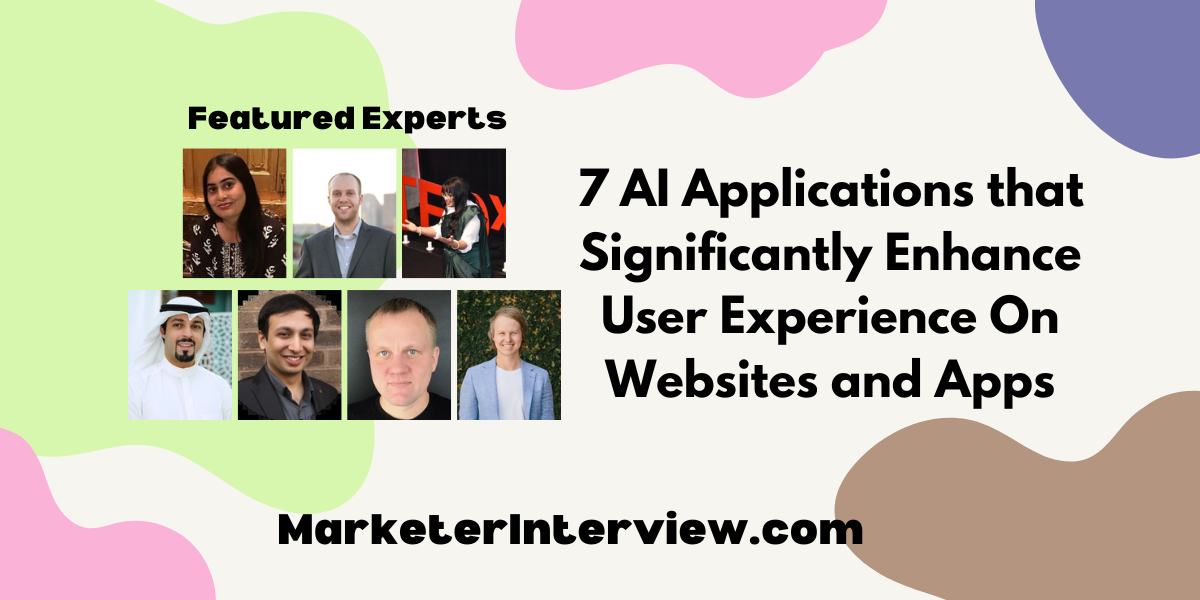7 AI Applications that Significantly Enhance User Experience On Websites and Apps
Exploring the dynamic intersection of artificial intelligence and user experience, we’ve gathered insights from seven industry experts, including CEOs and Founders, to illuminate the transformative power of AI in digital environments. From the integration of chatbots that enhance e-commerce interactions to AI-driven recommendations that streamline the shopping experience, this article delves into the specific applications and impacts of AI on UX.
Want to get quoted in MarketerInterview.com content just like this? Apply to become a contributor today!
Contents
- 1 Chatbots Enhance E-Commerce Interaction
- 2 GitHub Copilot Fosters Inclusive Development
- 3 AI Personalizes E-Commerce Experiences
- 4 AI Curates Personalized Content Recommendations
- 5 Machine Learning Personalizes Shopping
- 6 AI Personalization Transforms User Expectations
- 7 AI-Driven Recommendations Streamline Shopping
Chatbots Enhance E-Commerce Interaction
AI’s introduction of chatbots for instant customer service has fundamentally shifted the digital user experience, particularly in e-commerce. These AI-powered chatbots provide immediate, 24/7 responses to customer inquiries, streamlining the shopping experience.
From a personal perspective, implementing a chatbot on my online store transformed customer interaction—reducing response times, increasing customer satisfaction, and significantly boosting conversion rates.
This innovation not only addresses the demand for instantaneity in the digital age but also demonstrates AI’s potential to enhance user engagement in a tangible, impactful way.

Ryan Doser, Co-Founder, AI Insider Tips
GitHub Copilot Fosters Inclusive Development
One specific way in which it has transformed the user experience on websites and apps is by making experiences more inclusive. For example, if we consider GitHub Copilot, AI has essentially helped in building a more inclusive world by boosting productivity for developers! Research has shown that developers using the Copilot can code up to 55% faster and can focus on more satisfying work. For example, if a developer is attempting to write a function in a new computer language they are unfamiliar with, the Copilot will support their experience by providing in-context suggestions that support their tasks through those learning structures.
What is fascinating is that the system will also adapt to the developer’s personal coding style over time and is a great way to learn new languages. The biggest way it can support users with cognitive disabilities is by scaffolding new code and options so as to support users by not forcing them to remember and recall all the different functions.
For me, personally, as a Product Manager, I do not program on a daily basis, and in those few instances that I do, I may not always be familiar with all the snippets and best practices as it is not my traditional background. In this case, Copilot has transformed my user experience to make it less intimidating and stress-free! It’s the one thing I’ve appreciated about using the Copilot: the code suggestions have given me ideas on how to do some snippets better! I’m not a power user, and so in my case, I love using the Copilot to ensure I’m able to complete the tasks and also learn how to do things along the way.
This can be translated to any web product or service where AI can be used to scaffold tasks and support the completion time. This guidance is very impactful as it not only supports users with cognitive disabilities but supports all users in feeling included and supported!

Nandita Gupta, Accessibility Product Manager, Microsoft
AI Personalizes E-Commerce Experiences
AI has impacted digital platforms by personalizing user experiences. We can tailor the customer’s behavior (their choice, preferences, history) with machine-learning algorithms. It is now possible to dynamically generate different content and recommendations—for example, in e-commerce platforms. AI algorithms analyze human shopping behavior to predict future trends and find individualized shopping habits.
It ensures your customers are emotionally invested, improving overall satisfaction and increasing engagement and conversion rates. This integration of AI-driven personalization incorporates how customers interact with websites and applications. Continual customization and innovation in AI-driven personalization are increasingly revolutionizing customers’ expectations and setting a great benchmark in the digital user experience.

Dhari Alabdulhadi, CTO and Founder, Ubuy Kuwait
AI Curates Personalized Content Recommendations
One specific way AI has revolutionized user experience (UX) on digital platforms is through personalized content recommendations. AI has fundamentally transformed the UX by making it deeply personal and engaging, significantly increasing user satisfaction and retention rates.
The personalized recommendation systems powered by AI on platforms like Netflix have changed how users interact with digital content. Instead of browsing an overwhelming array of options, users are presented with a curated list of recommendations that feel tailor-made for their tastes. This simplifies the user’s decision-making process and enhances discovery, allowing users to find new favorites they might not have otherwise encountered. The impact of this AI-driven personalization is a more intuitive and satisfying user experience characterized by a sense of individual understanding and convenience.
The potential of AI in transforming UX through personalized recommendations extends beyond entertainment to sectors like e-commerce, where similar algorithms can suggest products, services, or content, enhancing the shopping experience. The technology can learn and evolve with user interactions, continuously refining the accuracy of its recommendations.

Vaibhav Kakkar, CEO, Digital Web Solutions
Machine Learning Personalizes Shopping
What is one specific way AI has revolutionized user experience on digital platforms like websites and apps? In my role as CEO and Founder of Toggl, I’ve witnessed the significant impact of AI in revolutionizing user experiences across digital platforms. One standout innovation is the use of machine learning to personalize user interactions. This technology dynamically adapts content and features to match individual user behaviors and preferences, significantly enhancing user engagement and satisfaction.
Dive into a specific application where AI has transformed UX, offering your unique perspective on its impact and potential. One vivid example of AI transforming UX is found in the arena of e-commerce, specifically in personalized shopping experiences. Platforms utilizing AI can analyze past purchase history, browsing behavior, and even social media activity to tailor product recommendations directly to the user.
This not only simplifies the shopping process by filtering out irrelevant content but also significantly boosts conversion rates by presenting users with products they are more likely to purchase. This application of AI demonstrates its vast potential to not only enhance user engagement but also drive business outcomes through a more intuitive and personalized UX.

Alari Aho, CEO and Founder, Toggl Inc
AI Personalization Transforms User Expectations
AI-driven personalization is a game-changer. It’s tailored the digital landscape to suit individual user preferences in real time. Think about Netflix’s recommendation engine—that’s AI in prime form. It dissects viewing habits and serves up exactly what you’re likely to enjoy next.
This isn’t just convenience; it’s a paradigm shift. Users no longer tolerate one-size-fits-all interfaces. They crave and now expect an intuitive, bespoke experience that seems to read their minds. AI makes that a reality. It’s effectively bridging the gap between user desires and digital offerings.
Businesses leveraging this see engagement soar. They’re tapping into the holy grail of UX—a deeply personal connection with their audience. It’s transformative; for users, a delightful journey, and for businesses, a robust bottom line. The potential? Limitless. We’re barely scratching the surface of personalized UX, and AI is our most powerful tool yet.

Casey Jones, Founder and Head of Marketing, CJ&CO
AI-Driven Recommendations Streamline Shopping
Since ChatGPT’s OpenAI was launched, and Google supported AI-backed solutions with its innovations like Bard and Gemini, the use of AI has skyrocketed. AI is shaping user experiences on different digital platforms because of its personalized recommendation systems.
For instance, when you visit an online store, or a brick-and-mortar store for that matter, you are bombarded with options, which can be time-consuming and frustrating. However, AI-driven recommendation systems powered by algorithms like machine learning and collaborative filtering are an excellent way to avoid this problem.
These systems analyze vast amounts of user data, including browsing history, purchase intent, and contextual insights like time or location, for delivering recommendations according to user preferences.
Users can get a more streamlined experience instead of wading through endless product lists. They get curated suggestions aligning with their interests and needs, and this saves time as well as makes the UX more navigable.

Ritika Murkya, Executive Assistant, eResource Scheduler
Want to get quoted in MarketerInterview.com content just like this? Apply to become a contributor today!






